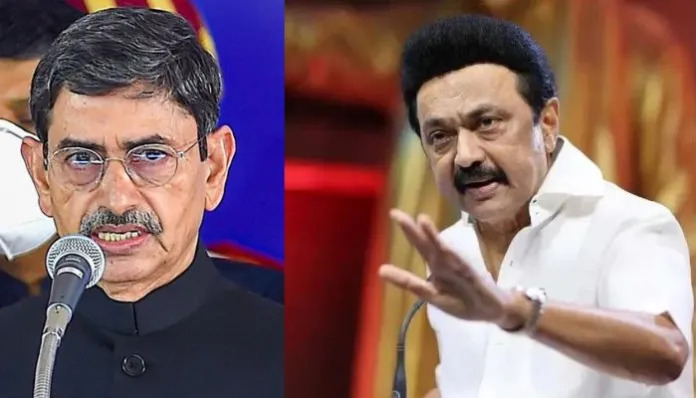In recent developments, there appears to be a resurgence of tensions between the Tamil Nadu government and the Governor, with the involvement of the DMK mouthpiece in a fresh attack. These incidents have attracted attention due to the usage of derogatory language by the DMK representative towards the Governor. Yesterday, the Governor was referred to as ‘half-boiled’, and today, the derogatory term used was ‘croton plant pot’.
The relationship between the Tamil Nadu government and the Governor has been a subject of interest and discussion in recent years. As with any state in India, Tamil Nadu also experiences occasional tensions and conflicts between the state government and the Governor’s office. These conflicts can arise due to a variety of factors, including political differences, administrative matters, or disagreements on policy decisions.
The Governor of Tamil Nadu, appointed by the President of India, holds a significant constitutional position. The Governor acts as the representative of the central government at the state level and plays a crucial role in ensuring the proper functioning of the state government within the framework of the Constitution. The Governor’s primary responsibilities include safeguarding the interests of the state, upholding constitutional values, and ensuring that the state government functions within the legal and constitutional framework.

Conflicts between the Tamil Nadu government and the Governor can arise from the differing political affiliations and ideologies of the respective parties involved. In a democratic setup, political parties have their agendas, priorities, and policies that they strive to implement. When the ruling party in the state holds different views or follows a different political ideology compared to the Governor, it can lead to disagreements and conflicts on various issues.
Policy matters are often a significant source of conflict between the state government and the Governor’s office. The state government formulates and implements policies based on its political ideology and electoral promises. However, the Governor acts as a check and balance to ensure that these policies align with the broader constitutional framework and the welfare of the state’s citizens. In situations where the Governor believes that certain policies may be unconstitutional or against the interests of the state, conflicts can arise as the state government seeks to pursue its agenda.
Administrative matters can also contribute to conflicts between the state government and the Governor. The Governor has the power to appoint or dismiss certain officials and hold control over specific administrative functions. Disagreements may arise when the state government seeks to assert its authority or implement administrative decisions that are at odds with the Governor’s directives or preferences.
Moreover, conflicts can be fueled by political rivalries and power struggles. The Governor, as a representative of the central government, may have affiliations with a political party that is different from the ruling party in the state. This can create a situation where political differences and clashes of interest become more pronounced. Both the state government and the Governor may attempt to assert their authority and protect their respective interests, leading to heightened tensions.
It is important to note that conflicts between the Tamil Nadu government and the Governor are not unique to this particular state. Similar tensions have been observed in various other states across India throughout its history. The nature and intensity of these conflicts can vary depending on the individuals involved and the specific political context of the state.
To address conflicts and ensure the smooth functioning of the state government, both parties need to engage in open dialogue and maintain a spirit of cooperation. Healthy debates, discussions, and negotiations can help bridge the gaps and find common ground to work towards the betterment of the state and its people.
In recent years, there have been instances where conflicts between the Tamil Nadu government and the Governor have garnered significant media attention. These incidents have often involved public statements, political posturing, and legal battles. The media plays a crucial role in highlighting and analyzing these conflicts, thereby bringing them to the public’s attention and fostering a sense of accountability.
To stay updated on the current dynamics between the Tamil Nadu government and the Governor, it is advisable to refer to reliable news sources, explore media reports, and analyze the statements and actions of the parties involved. By gaining a comprehensive understanding of the context and specifics of each conflict, one can form a more informed opinion about the relationship between the Tamil Nadu government and the Governor.
In conclusion, conflicts and tensions between the Tamil Nadu government and the Governor are not uncommon. These conflicts can arise due to political differences, administrative matters, or disagreements on policy decisions. The Governor, as a constitutional authority, acts as a check and balance to ensure that the state government functions within the legal framework and in the best interests of the state.
Healthy dialogue, open discussions, and a spirit of cooperation are essential in resolving conflicts and ensuring the smooth functioning of the state government. By staying informed through reliable news sources, individuals can gain a comprehensive understanding of the current dynamics between the Tamil Nadu government and the Governor.












